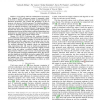Free Online Productivity Tools
i2Speak
i2Symbol
i2OCR
iTex2Img
iWeb2Print
iWeb2Shot
i2Type
iPdf2Split
iPdf2Merge
i2Bopomofo
i2Arabic
i2Style
i2Image
i2PDF
iLatex2Rtf
Sci2ools
105
click to vote
NDSS
2015
IEEE
2015
IEEE
Opaque Control-Flow Integrity
Abstract—A new binary software randomization and ControlFlow Integrity (CFI) enforcement system is presented, which is the first to efficiently resist code-reuse attacks launched by informed adversaries who possess full knowledge of the inmemory code layout of victim programs. The defense mitigates a recent wave of implementation disclosure attacks, by which adversaries can exfiltrate in-memory code details in order to prepare code-reuse attacks (e.g., Return-Oriented Programming (ROP) attacks) that bypass fine-grained randomization defenses. Such implementation-aware attacks defeat traditional fine-grained randomization by undermining its assumption that the randomized locations of abusable code gadgets remain secret. Opaque CFI (O-CFI) overcomes this weakness through a novel combination of fine-grained code-randomization and coarsegrained control-flow integrity checking. It conceals the graph of hijackable control-flow edges even from attackers who can view the complete sta...
Related Content
| Added | 15 Apr 2016 |
| Updated | 15 Apr 2016 |
| Type | Journal |
| Year | 2015 |
| Where | NDSS |
| Authors | Vishwath Mohan, Per Larsen, Stefan Brunthaler, Kevin W. Hamlen, Michael Franz |
Comments (0)

